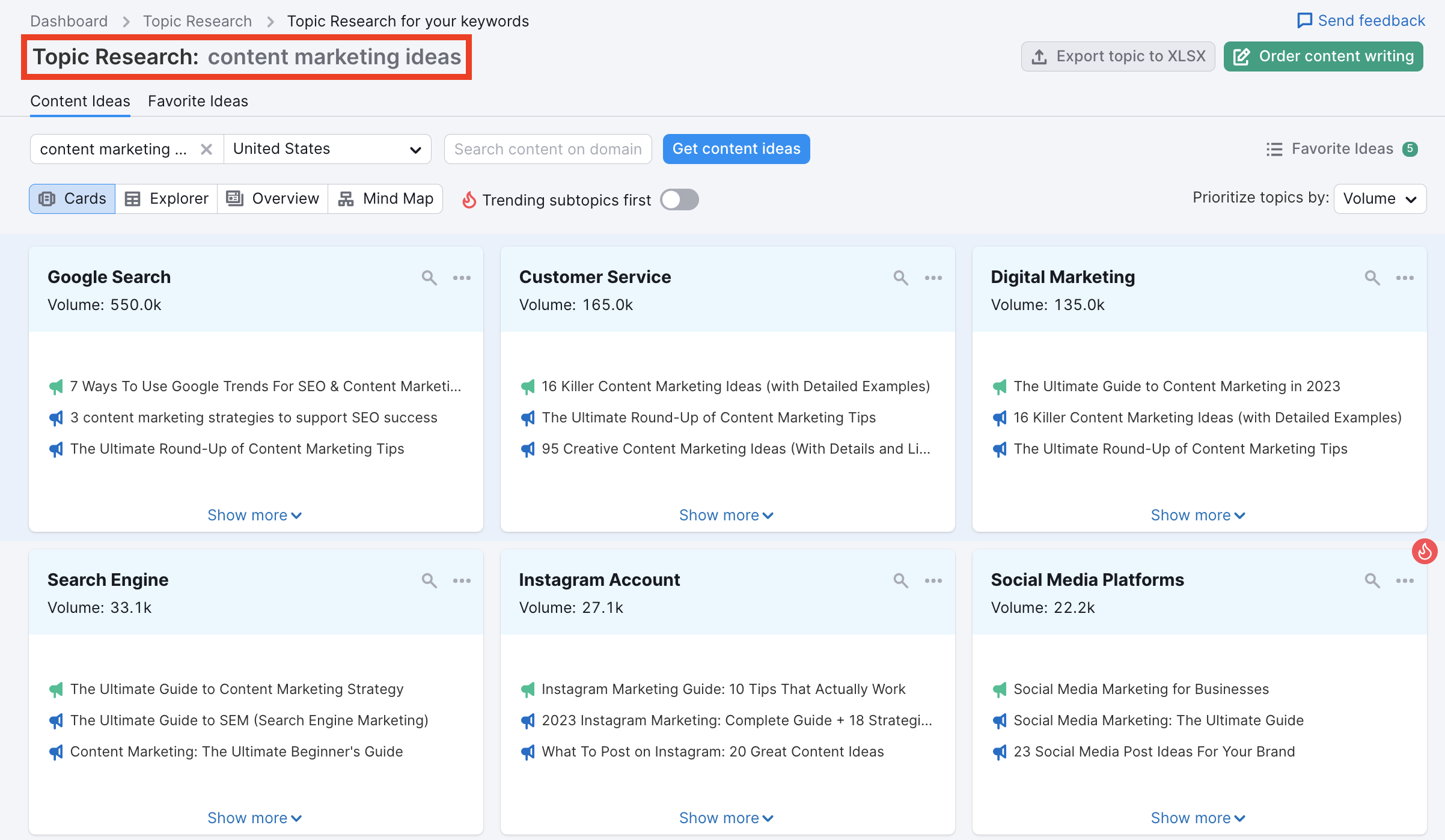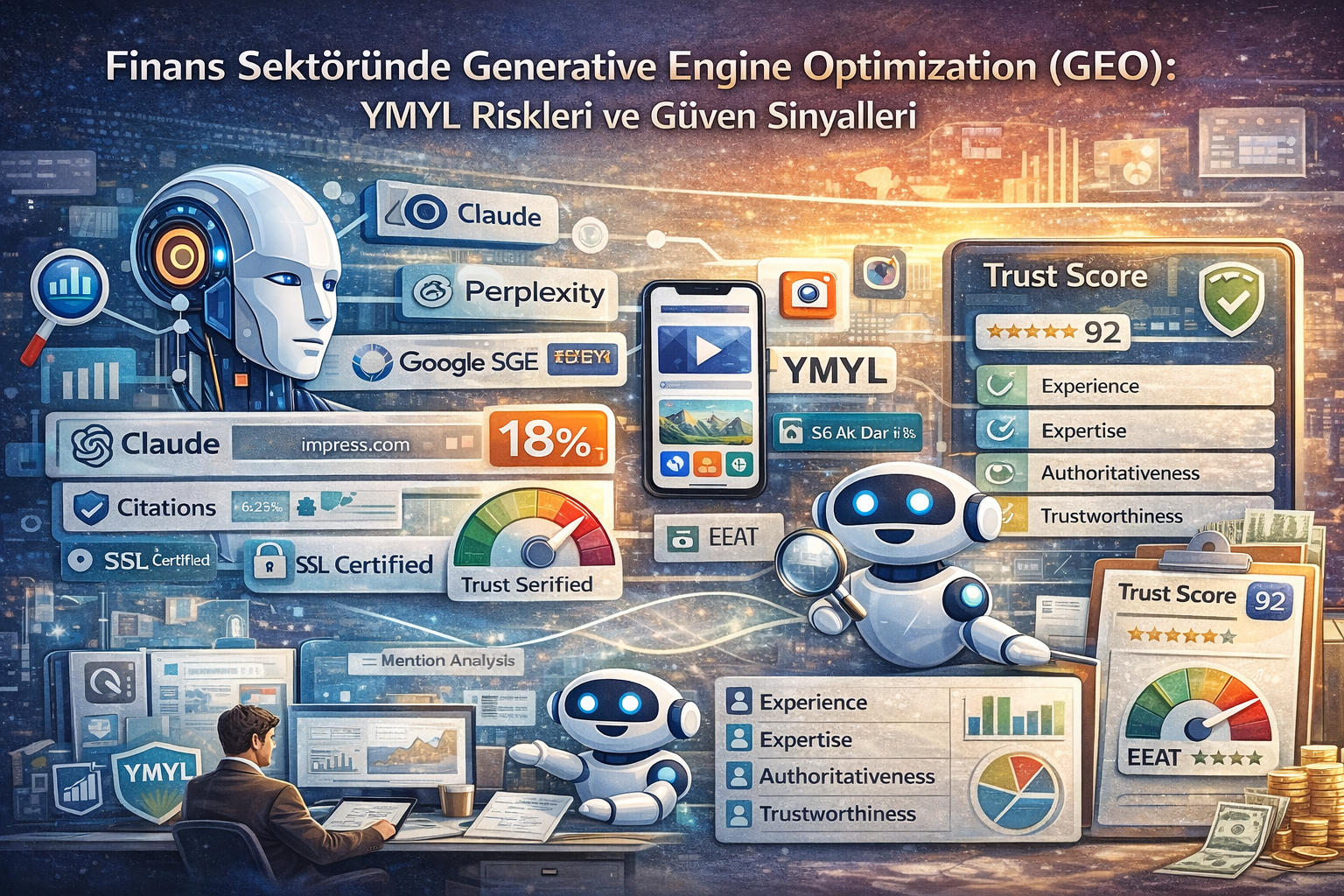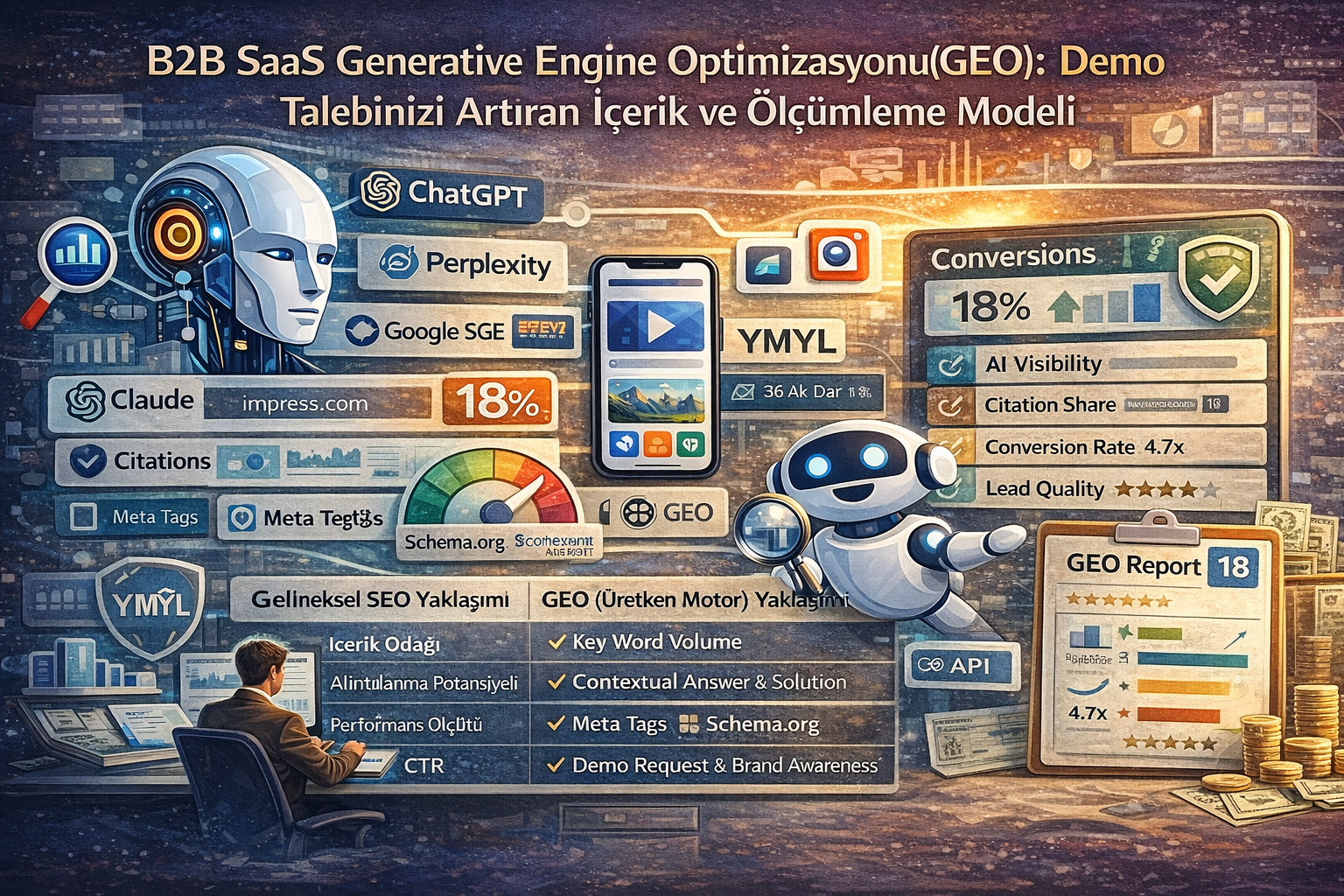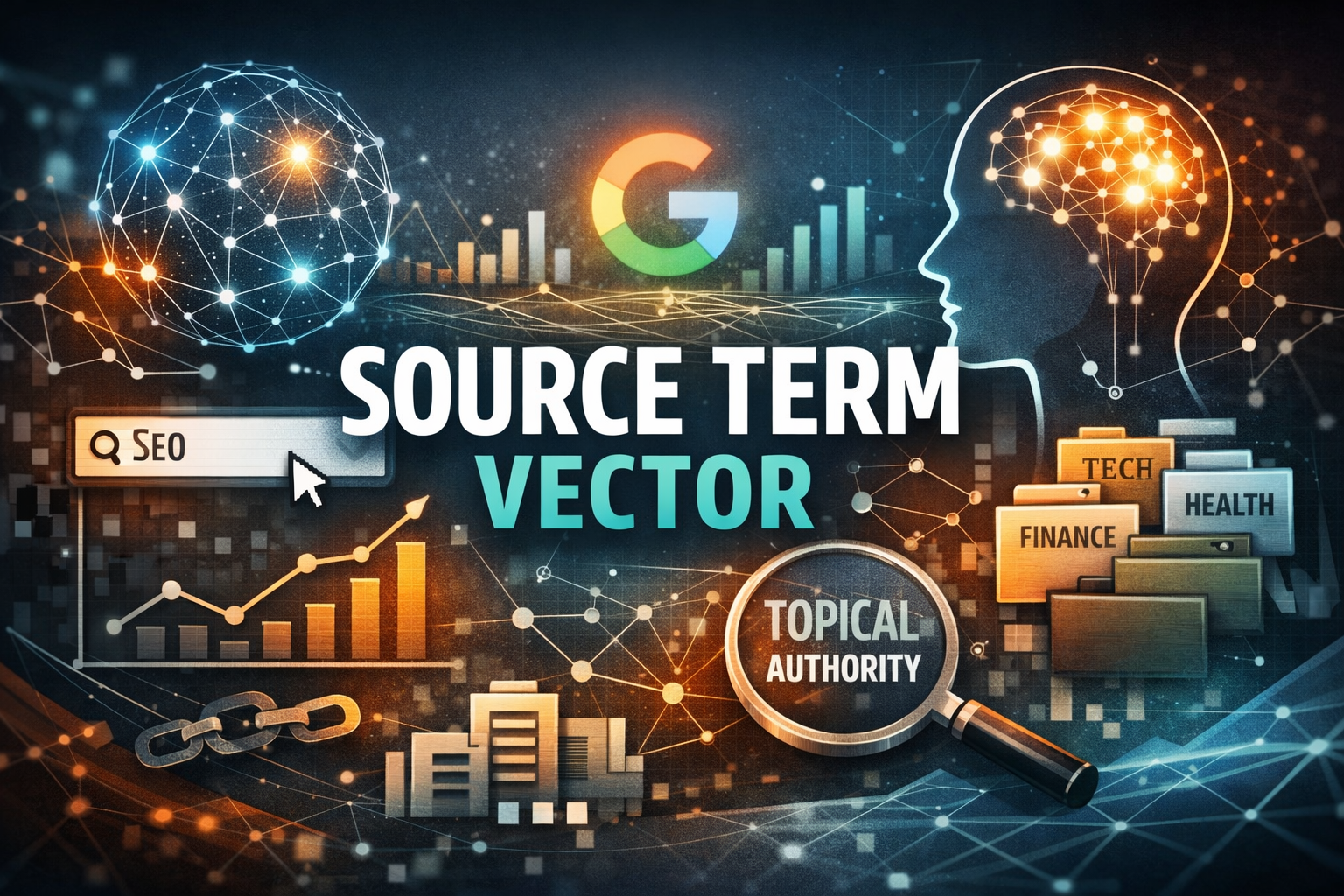
Analytica House
Şub 9, 2023SEO ve İçerik Manzarasında Yapay Zekanın Rolü

Yapay zeka (AI), görsel algı, konuşma tanıma, karar verme ve dil çevirisi gibi normalde insan zekâsı gerektiren görevleri yerine getirebilen bilgisayar sistemlerinin geliştirilmesidir. Açıkça programlanmadan, AI sistemleri eğitildikleri verilere dayanarak kendi başlarına öğrenmek ve karar vermek üzere tasarlanmıştır. Yapay zekanın amacı, insan zekâsını simüle edebilen ve daha önce yalnızca insana özgü olduğu düşünülen görevleri yerine getirebilen sistemler geliştirmektir.

Yapay zeka, çeşitli görevleri otomatikleştirerek ve daha önce erişilemeyen içgörüler sağlayarak SEO alanını dönüştürüyor. Anahtar kelime araştırması, içerik oluşturma ve optimizasyonu, link inşası ve diğer SEO ve içerik ile ilgili görevlerin tümü yapay zeka araçlarıyla gerçekleştirilmektedir. Bu araçlar, SEO uzmanlarının zaman ve emekten tasarruf etmesini sağlarken daha doğru sonuçlar sunar. Gelin yapay zekanın SEO ve içerik görevlerinde nasıl kullanılabileceğine ve bu alandaki geleceğine daha yakından bakalım.

Anahtar Kelime Araştırmasında Yapay Zeka
Anahtar kelime araştırmasında yapay zeka, bir web sitesinin hedeflemesi gereken en alakalı ve kârlı anahtar kelimeleri belirlemek için kullanılır. Yapay zeka araçları, arama hacimleri, rekabet seviyeleri ve kullanıcı davranış kalıpları gibi büyük miktarda veriyi analiz ederek en uygun anahtar kelimeleri belirlemeye yardımcı olabilir. Bu, SEO uzmanlarına hedef kitlelerini ve onların ilgili ürün ve hizmetleri bulmak için kullandıkları anahtar kelimeleri daha iyi anlama imkânı verir. Yapay zeka, bir web sitesindeki içerikleri, rakip siteleri ve diğer kaynakları analiz ederek anahtar kelime önerileri sunabilir ve yeni anahtar kelime fırsatlarını belirleyebilir. AI algoritmaları, anahtar kelimelerin alaka düzeyini ve bağlamını değerlendirebilir, seçilen anahtar kelimelerin web sitesinin genel teması ve hedefleriyle uyumlu olmasını sağlar. Yapay zeka, anahtar kelime araştırmasını devrim niteliğinde değiştirerek web sitelerinin optimizasyonuna ve arama sıralamalarına yardımcı olacak daha doğru ve uygulanabilir içgörüler sağlar.
Anahtar Kelime Araştırmasında Yapay Zeka Kullanmanın Avantajları
Anahtar kelime araştırmasında yapay zeka kullanımı, daha doğru, daha hızlı ve maliyet açısından verimli sonuçlar sağlayarak web sitesi optimizasyonunun ve arama sıralamalarının iyileştirilmesine yardımcı olur. Yapay zeka şunları yapabilir:

- Büyük miktarda veriyi analiz ederek seçilen anahtar kelimelerin son derece alakalı ve doğru olmasını sağlar,
- Çok büyük veri setlerini saniyeler içinde işleyerek zaman ve emekten tasarruf sağlar,
- Kullanıcı davranış kalıplarını analiz ederek hedef kitlenin kullandığı anahtar kelimeleri ve ifadeleri anlamaya yardımcı olur,
- Her anahtar kelimenin rekabet seviyelerini analiz ederek daha az rekabetli ve daha kârlı kelimeleri belirler,
- Yeni anahtar kelime önerileri sunar ve gözden kaçmış olabilecek fırsatları ortaya çıkarır,
- Kullanıcının konumu, arama geçmişi ve diğer faktörlere göre kişiselleştirilmiş anahtar kelime sonuçları sunar, böylece sonuçlar daha alakalı ve değerli olur.
Liste uzatılabilir. Ancak burada tüm avantajları listeleyemeyiz çünkü bu sadece başlangıç ve okumaya devam ettikçe göreceğiniz üzere bu liste gelecekte çok daha uzun olacaktır.
Anahtar Kelime Araştırması için Yapay Zeka Araçlarına Örnekler

En popüler anahtar kelime planlama araçları aslında fikir üretmek için yapay zekadan yararlanır. Anahtar kelime planlama söz konusu olduğunda akla gelen ilk SEO araçlarından bazıları şunlardır:
SEMrush
SEMrush, anahtar kelime araştırması, site denetimi, rakip analizi ve diğer görevleri gerçekleştirmek için yapay zeka algoritmalarını kullanan hepsi bir arada dijital pazarlama aracıdır. Arama hacmi, rekabet, trend analizi ve uzun kuyruklu kelime önerileri gibi ayrıntılı anahtar kelime verileri sunar. SEMrush yalnızca araştırma veya yazım aşamasında değil, içerik planlamasında da destek sağlar. Kendi makine öğrenimi algoritmalarıyla SEMrush, kullanıcılarına popüler ve SEO dostu içerik konuları önerir.

Tek yapmanız gereken bir konu tanımlamaktır. Geri kalanını yapay zeka teknolojisi halleder. Konunuzu tanımladıktan sonra araç size farklı konu grupları ve her grup için 3’ten fazla içerik fikri sunar.
Ahrefs
SEMrush ile benzer ve farklı özelliklere sahip olan Ahrefs, yapay zeka algoritmaları kullanarak anahtar kelime araştırması ve analizi yapan popüler bir SEO aracıdır. Arama hacmi, tıklama başı maliyet, anahtar kelime zorluğu gibi veriler sağlar ve yeni anahtar kelime önerileri sunar. Bu, çok büyük veri setlerinin yönetilmesi anlamına gelir. SEMrush gibi Ahrefs de yapay zekadan faydalanır.
Google Keyword Planner
Google Keyword Planner, Google’ın ücretsiz anahtar kelime araştırma aracıdır. Yapay zeka algoritmalarını kullanarak anahtar kelime popülerliği, rekabet seviyeleri ve tahmini tıklama başı maliyet hakkında bilgi sağlar. Ayrıca ilgili anahtar kelimeler ve ifadeler önerir.
İçerik Oluşturma ve Optimizasyonunda Yapay Zeka
Yapay zeka, yüksek kaliteli, alakalı ve ilgi çekici içerik oluşturmaya yardımcı olmak için içerik oluşturma ve optimizasyonunda kullanılıyor. Yapay zeka algoritmaları, arama motoru sonuçları, sosyal medya trendleri ve kullanıcı davranış kalıpları gibi devasa veri setlerini analiz ederek belirli bir kitle için en alakalı ve değerli konu, anahtar kelime ve ifadeleri belirlemeye yardımcı olabilir.
İçerik Oluşturma ve Optimizasyonunda Yapay Zeka Kullanmanın Avantajları
Aşağıda yapay zekanın içerik oluşturma ve optimizasyonunda kullanılmasının bazı avantajları yer almaktadır:
- Yazmadan önce bilgi toplayarak konu hakkında makaleler bulmak,
- Kullanıcı davranışları, arama motoru sonuçları ve sosyal medya trendlerini analiz ederek en alakalı konuları belirlemek,
- Yeni, özgün ve ilgi çekici içerikler oluşturmaya yardımcı olarak daha fazla yaratıcılık ve çeşitlilik sağlamak,
- Konum, arama geçmişi ve diğer faktörlere göre kişiselleştirilmiş içerik önerileri sunarak doğru hedef kitleye ulaşmak,
- Mevcut içerikleri analiz ederek optimizasyon önerileri sunmak ve içeriklerin SERP’lerde görünürlüğünü ve sıralamasını artırmak.
Backlink Oluşturmada Yapay Zeka
Yapay zeka, yüksek kaliteli, alakalı ve otoriter backlink’lerin oluşturulmasına ve yönetilmesine yardımcı olmak için backlink stratejilerinde kullanılır. Yapay zeka algoritmaları, arama motoru sonuçları, sosyal medya trendleri ve kullanıcı davranışlarını analiz ederek hedef kitle için en değerli ve alakalı siteleri ve sayfaları belirleyebilir.

Yapay zeka ayrıca backlink inşasında her bağlantının rekabet seviyelerini analiz ederek de yardımcı olabilir. Bu, misafir yazı yazılabilecek yeni siteler bulmayı, bozuk bağlantıları tespit edip değiştirmeyi ve backlink için yeni sitelerle iletişime geçmeyi içerebilir.
Backlink İçin Yapay Zeka Araçlarına Örnekler
Backlink oluşturma için Ahrefs ve SEMrush gibi kapsamlı yapay zeka destekli SEO araçları kullanılabilir. Ancak backlink odaklı araçlarda da yapay zeka teknolojisinden yararlanılmaktadır.
Majestic
Majestic, backlink analizi yapan bir araçtır ve backlink’leri yapay zeka algoritmalarıyla analiz ederek kategorize eder. Backlink gücü, bağlantı kalitesi ve alaka düzeyi hakkında bilgi sağlar ve yeni bağlantı fırsatları sunar. Bu verileri sağlamak için yapay zekaya dayanır.
BuzzStream
BuzzStream, backlink oluşturma ve iletişim yönetimi aracıdır. İletişim bilgilerini bulma, e-postalar gönderme ve yanıtları takip etme gibi tekrar eden görevleri otomatikleştirir. Backlink oluşturma sürecini kolaylaştırır ve sonuçları iyileştirir.
SEO ve İçerikte Yapay Zekanın Geleceği
Yapay zekanın anahtar kelime planlama, içerik planlama ve yazma, backlink optimizasyonu ve SEO dışındaki birçok kullanımını göz önünde bulundurduğumuzda, yakın gelecekte yapay zekanın:
- Kullanıcılar için arama deneyimini daha kişiselleştirilmiş, alakalı, faydalı ve değerli hale getirmede daha büyük rol oynaması,
- Sesi arama teknolojisini daha doğru, hızlı ve duyarlı hale getirerek kullanıcı deneyimini iyileştirmesi,
- Daha da gelişerek büyük miktarda veriyi gerçek zamanlı olarak analiz edebilecek kadar sofistike bir hâle gelmesi,
- Daha öngörücü hâle gelerek içeriklerde kullanılacak en iyi konular, anahtar kelimeler ve ifadeleri belirlemesi ve en etkili optimizasyon stratejilerini önermesi,
- Daha fazla SEO görevini otomatikleştirerek manuel çabayı azaltması ve doğruluğu ile verimliliği artırması,
- İçerik oluşturma sürecinde daha önemli bir rol oynaması, yeni, özgün ve ilgi çekici içerikler üretmeye yardımcı olması,
- Ve sanal ile artırılmış gerçeklikte daha büyük bir rol oynayarak kullanıcı deneyimini geliştirmesi, daha etkileşimli ve sürükleyici içerikler yaratması beklenmektedir.
Yapay Zeka İnsan Yazarların Yerini Alacak mı?
Bu soru son zamanlarda sık sık soruluyor. Aslında makinelerin, bu bağlamda yapay zekanın, insan işlerini devralacağı düşüncesi yeni değil. Dolayısıyla şu anda insanların işlerini kolaylaştırmak için kullanılan yapay zekanın gelişerek işleri tamamen devralacağı fikri normal. Bu soruya yapay zekadan faydalanan tüm alanlar için net bir yanıt vermek zor. Ama bu soruya içerik dünyası özelinde bakalım.
İçerik üretimi söz konusu olduğunda, yapay zeka raporlar, haber metinleri ve ürün açıklamaları gibi nispeten düz ve fazla yaratıcılık gerektirmeyen görevler için daha uygundur. Ancak bu araçlardan en iyi çıktıyı alabilmek için hâlâ insanın yönlendirmesine ihtiyaç vardır; yani yapay zekaya hangi tonda, hangi kelimelerle, hangi uzunlukta ve hangi kriterlerle metin üretmesi gerektiğini yazar ya da yönlendiren kişi belirler.
Kısacası, yapay zeka metin üretiminde son derece güçlü bir araç olsa da özellikle daha yaratıcı ve öznel yazı türlerinde insan yazarların yerini tamamen alması yakın zamanda pek olası değildir. Yine de konu yapay zekaysa asla asla dememek gerekir.
Kaynaklar
- Search Engine Land – Yapay Zeka SEO’nun Geleceğini Nasıl Değiştirecek
- RockContent – SEO’da Yapay Zeka
- Keyword Country – Anahtar Kelime Araştırmasında Yapay Zeka
- Search Engine Land – Link Oluşturmada Yapay Zekayı Kullanma
- Convince & Convert – SEO’nun Geleceği
- Search Engine Journal – SEO için Yapay Zeka
More resources

Finans Sektöründe Generative Engine Optimizasyonu (GEO): YMYL Riskleri ve Güven Sinyalleri
Yapay zeka teknolojilerinin arama motoru ekosistemine entegre olmasıyla birlikte, geleneksel SEO (Ar...

B2B SaaS Generative Engine Optimizasyonu (GEO): Demo Talebinizi Artıran İçerik ve Ölçümleme Modeli
Dijital pazarlama dünyası, geleneksel arama motoru optimizasyonundan (SEO), yapay zeka odaklı arama...

Source Term Vector Nedir?
Source Term Vector, bir web sitesinin zaman içinde ürettiği içerikler, bu içeriklerin eşleştiği sorg...

